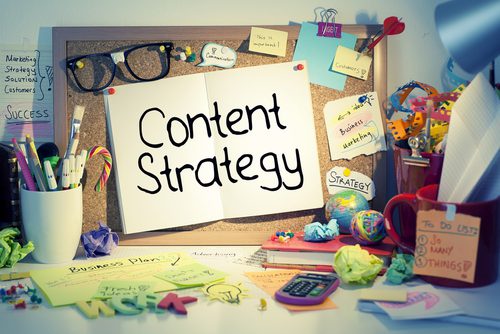 Reading Time: 4 minutes
Reading Time: 4 minutesContent marketing is one of the most cost-friendly and effective ways to draw in new and existing customers. And while most businesses use some form of content marketing, many don’t have a complete content marketing strategy. It’s not uncommon for people to dive right into execution without planning ahead of time.
Having a digital content strategy can help you make the most of your content marketing. Not only can you better create relevant content with a comprehensive strategy, but it can also be engaging, targeted at the right parts of your audience, and trackable so that you can make well-informed decisions for your audience.
But what is a content strategy? While content is what you produce to pull in your customers – be it blogs, articles, videos, or social media – simply creating and putting something out there won’t be enough to see results. Content strategy is the process of planning, documenting, assessing, and updating your content approach to get the best results for your business.
Fully developing a strategy will keep you from creating content that doesn’t go anywhere and instead enable you to create meaningful experiences for your audience. If you’re ready to start a new content marketing strategy or you want to enhance your current one, consider these tips.
- Create Content for Every Stage of the Customer Journey
No matter what industry you’re in, your customers will follow the same journey from awareness of a product, to consideration, to eventual purchase. This sales funnel makes a straightforward process, and it’s your job to help guide your customers through it. Content can help with that process – so long as you gear it to the right audience.
Most content marketing strategies gear their content toward customers who are in the awareness and consideration stages, but you can effectively make content for every stage of the funnel. The key is to know which stage you’re targeting, then make sure your content focuses on that step. A customer at the awareness stage doesn’t want content that includes a hard sell, but someone in the purchase stage will have a much better response.
- Establish Goals for Your Content
Most companies turn to content because it’s an effective way to market their brand and products. However, you want to know what sort of impact your content is having, rather than just posting randomly to maintain your presence. Before you get too far into creating and uploading content, you’ll want to set goals for what that content should do.
You wouldn’t keep putting money into an advertisement if it wasn’t selling any products – and you don’t want to keep creating content that doesn’t get results. Setting a goal helps you understand if your content was successful or if you need to try out an alternative strategy.
- Work With a Dedicated Content Manager
Content marketing takes a lot of time and dedication to do correctly. If you’re running your content marketing strategy along with other responsibilities of your business, then you likely won’t have the capacity to give your content marketing the attention it needs to bring in results. You can either establish a content manager in your company, or you can even work with an agency. The more dedicated and experienced your content manager is, the better results you’ll likely see.
- Focus on Producing Consistent, Quality Content
If you’re trying to market yourself, the instinct may be to try and produce as much content as quickly as possible. The problem is that you’re not the only marketer thinking this, and there’s likely even someone else trying to appeal to your same target audience. The internet has numerous things trying to capture reader’s attention, and that means you’re competing to get people to give your content a chance.
Yes, you want regular content so that readers have something to come back to, but you don’t want to produce so much content that it isn’t worth anything. One high-quality post can have much more impact than ten low-caliber posts. Establish a level of quality you want for all your content, find out how long it takes you to make it, and don’t cut corners for the sake of publishing. Your readers will appreciate the value you give them, rather than the potential spam.
- Understand Your Audience
While you want to create content that appeals to the different stages of the sales funnel, that’s only one part of the equation. You need to know your audience so that you can write content that not only interests them but is also relevant; someone who’s just now learning about a subject will need much more information than an expert.
The audience you target will impact the topics, elaboration, and language that you use in your content. Once you identify your audience, it makes it much easier for you to answer the questions they might have, not to mention you’ll have much more luck putting that content in front of the right audience. And when you consider your audience and goals together, you can have killer content.
- Generate Fresh and Original Ideas
One of the most difficult aspects of content marketing is that you need ideas to keep producing content. For marketing, you’ll want your content to be relevant to your business and products, which ultimately eliminates topics that have nothing to do with your company. This can make it hard to regularly come up with new content. However, if you want to keep your audience engaged and not have issues with your SEO, it’s what you need to do.
Thankfully, there are numerous strategies and tools you can use to generate ideas. Conducting regular research to see what content your readers want and what others are producing can help you find your niche. When you can bring something to the table that other content creators can’t, then you have a way to appeal to your audience.
- Create a Content Calendar
With so much going on in the process of content creation, it can be difficult to stay on top of thinking up ideas, creating the content, then publishing it online. The key to doing just that is to create a content calendar. On it, you should mark what posts you plan on doing, what days they’re going live, and what time you plan to post it.
Regardless of if you make your content calendar physically or digitally, you’ll want to plan for at least the next several months. Giving yourself this outline means that you can have topics at the ready, without having to worry about running out of ideas when the content needs to go up within the week. For best results, keep a universal calendar that includes your plans for all platforms where you publish content.
Content marketing can have a great impact on your business, but you need the right strategy to do it. With these tips, you can form a plan that will help you create content your audience looks forward to.




